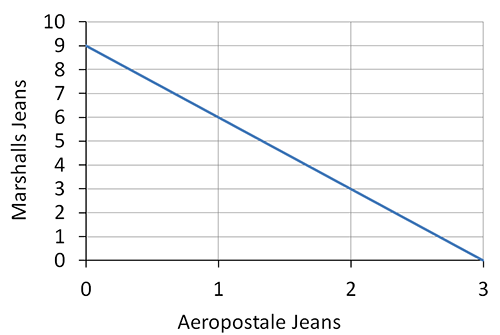Try It
Budget Line Graph
Shopping for Jeans
Your mother has given you $150 to buy some new jeans for school. You tried some jeans on at Aeropostale last week that you loved and they cost $46.50. Your mother tells you that she found some similar to these at Marshalls for $16.00. Your mother will let you decide how to spend your jeans allowance but this is all she will be giving you. You could buy only the ones you love from Aeropostale. You could check out the ones that your mother suggested (you could like them!) and spend all of your money on them. Or you could get a combination of the two.
We will be assuming that tax is included in the price for this lesson.
Problem #1
If you were to get the ones from Aeropostale, how many pairs can you buy?
Answer: 3 pairs
Problem #2
If you were to get the ones from Marshalls, how many pairs can you buy?
Answer: 9 pairs
Budget Line Graph for Jeans
You can see the budget line graph of your situation below. This graph represents the number of pairs not the cost.

See larger version of jeans budget graph here.
Problem #3
If you were to buy one pair from Aeropostale, how many could you buy from Marshalls?
Answer: 6 pairs
Problem #4
If you were to buy two pairs from Aeropostale, how many pairs can you buy from Marshalls?
Answer: 3 pairs

See larger version of jeans budget graph here.
Problem #5
Let's write an equation of this line.
What is the slope of the line?
Answer: -3
Problem #6
What is the y-intercept?
Answer: 9
Problem #7
What is the equation of the line?
Answer: y = -3x + 9

See larger version of jeans budget graph here.
As you can see, you have options. There is no single combination that is the only one that will work in this situation. Some will choose to have more of the less expensive jeans. Others will choose to have fewer jeans in order to have the more expensive ones that they really want. This is a basic budgeting dilemma. Of course, you will have many more decisions about what to spend on than just jeans.